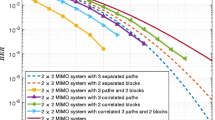Abstract
The classical receiver performs separately three tasks, namely, channel estimation,equalization and decoding. The optimal receiver however would treat them jointly but is often non-tractable due to its tremendous complexity. Throughout this thesis, we identified contexts where this sub-optimality could entail substantial performance loss with the help of the Matched Filter Bound (mfb). Three main contexts were pointed out: wireless LAN with very high data rate and granularity constraints, high data rate cdma with low spreading factor and advanced tdma systems with high order modulation and/or Multiple Input Multiple Output channel. Once these contexts identified, we then tried to alleviate this impairment by suggesting low complexity sub-optimal receivers that perform iteratively/jointly channel estimation,equalization, and decoding (retransmission is seen as a special case of channel coding). In order to tackle the complexity issue while keeping the Maximum A Posteriori criterion, efficient reduced state trellis search techniques mainly based on Per Survivor Processing (psp) are exhaustively described and put into practice for the aforementioned contexts. A generalization of the well known psp technique consisting quite simply in keeping more than one survivor per state was proved to be very robust to error propagation even in the case of non minimum phase channels. This generalization was first introduced for the Generalized Viterbi Algorithm (gva) and the technique itself is refereed as Generalized Per Survivor Processing (gpsp) in this thesis.
Similar content being viewed by others
Author information
Authors and Affiliations
Rights and permissions
About this article
Cite this article
Visoz, R. Traitement itératif conjoint pour les systèmes mobiles sans fil. Ann. Télécommun. 57, 306 (2002). https://doi.org/10.1007/BF02994640
Issue Date:
DOI: https://doi.org/10.1007/BF02994640




